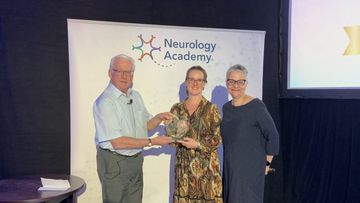Improving Inpatient Management of Parkinson’s at SWBH
Background
The 2006 NICE guidelines for Parkinson’s offer advice for the best management of hospital inpatients with Parkinson’s.¹ The guidance advises that Parkinson’s drugs should not be withdrawn abruptly or changed suddenly on admission to hospital. This involves making every effort to give Parkinson’s drugs at the usual time and at the patient’s usual dosage. Adjustments to their medication or their normal regime should only occur after discussion with a Parkinson’s specialist. The guidance also advises that Speech and Language therapy (SLT) input should be available to inpatients where necessary. The importance of local application of NICE guidelines is well recognised and has been audited nationally.²
Aim
The aim of this audit was to evaluate our Trust’s Parkinson’s Service against the national guidelines. Currently, within the Trust there are no local guidelines in place for the inpatient management of this complex disease.
Method
The Trust’s coding department identified all patients with Parkinson’s that had been admitted over a one year period between July 2013 – July 2014. 207 of the 560 patients identified were selected for audit with the remaining 353 patients excluded because they were: elective admissions, admissions less than 24 hours or where a formal diagnosis of Parkinson’s had not been made.
Data was collected by retrospective audit of 40 admissions, using a proforma tool based on NICE guidelines for Parkinson’s.
Results
PD medications administration
117 doses of various Parkinson’s medications were missed during in patient stay. 37% of patients brought their medication into hospital with them. Doses were also missed due to incomplete prescribing in 30% of cases, despite 92% of patients had a medication list available at the time of admission; either they were not prescribed or were prescribed incorrectly. Of those prescriptions that were incomplete, the majority took more than 48 hours to be corrected. Where the drug was non-formulary, it was often not immediately available, leading to delays in receiving their medication.
Referrals to Parkinson’s specialists
Patients were admitted for a range of clinical reasons and were managed by a mix of specialities. Of the 40 patients, 9 were managed on elderly care wards with direct input from a Parkinson’s specialist with the remainder of patients managed on other wards. 65% of patients were not referred to a Parkinson’s specialist.
However, where referrals were made to a Parkinson’s specialist, the time to review was efficient; 50% of referrals being made were within one day of admission and 57% were reviewed by a Parkinson’s specialist less than 48 hours later.
Nil-By-Mouth decisions
Nearly half of the patients were made nil-by-mouth at some point during the admission. However, only 37.5% were referred to SLT and, of those, less than half were seen within 24 hours. Alternative routes of Parkinson’s medications were considered; of the 19 patients nil-by-mouth, 8 had nasogastric tube in place, 5 had Madopar dispersible tablets and 6 had a Rotigotine patch.
Discussion
Parkinsons medications are being missed inappropriately. There is a lack of referral to Parkinson’s specialists in the Trust even though Parkinson’s is a very complex disease to manage. These findings reflect a lack of knowledge of Parkinson’s management amongst allied healthcare professionals and need for development of an inpatient pathway.
Recommendations
The Trust is developing an inpatient management of Parkinson’s pathway to improve patients’ continuity of medications on admission and to facilitate the direct admission of Parkinson’s patients to elderly care wards which have input from a Parkinson’s specialist. This will be made available to access via the Trust’s intranet. It is also necessary to liaise with pharmacy and the drug and therapeutic committee to improve availability of Parkinson’s
medications on wards.
To improve understanding of Parkinson’s, the audit findings were presented on the elderly care ward alongside an informative poster to educate allied healthcare professionals about Parkinson’s. Ward based education on nil-bymouth decisions took place to ensure nurses are aware of the importance of prompt referral to SLT, who should prioritise Parkinson’s referrals to be seen within 24 hours. To improve knowledge of Parkinson’s amongst junior doctors, teaching sessions will be delivered to raise awareness on the complications associated with abrupt withdrawal or sudden changes of Parkinson’s medications.
E Baker, A Majeed, N Afsheen, H Naqvi
References
- Parkinson’s disease – Diagnosis and management in primary and secondary care, NICE clinical guideline 35, 2006
- Parkinson’s UK Clinical Steering Committee, National Parkinson’s audit 2012.
More Parkinson's Academy Inpatient care Projects

'The things you can't get from the books'
Parkinson's Academy, our original and longest running Academy, houses 23 years of inspirational projects, resources, and evidence for improving outcomes for people with Parkinson's. The Academy has a truly collegiate feel and prides itself on delivering 'the things you can't get from books' - a practical learning model which inspires all Neurology Academy courses.